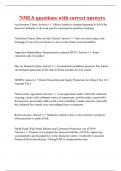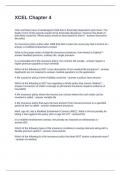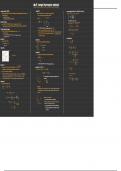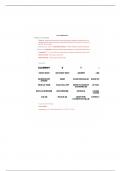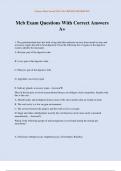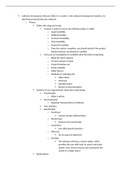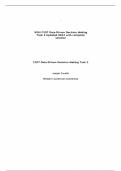Introduction to psychology
29/11/19 Intelligence
What is intelligence?
Multiple definitions
Agree that people differ in cognitive abilities
Definitions
Sir Francis Galton
o All the information that reaches us concerning the outside world passes through
the senses. The more perceptive the senses, the more information will reach us,
the larger the field upon which we can act.
Alfred Binet
o No explicit theory of intelligence
o Intelligence requires more complex measurement
o Intelligence involves reasoning, judgement, memory and abstraction.
David Wechsler
o The global capacity of a person to act purposefully, to think rationally, and to
deal effectively with his/her environment.
Robert Sternberg
o The cognitive ability to learn from experience, to reason well, to remember
important information, and to cope with the demands of daily living.
What do 1020 experts say?
Over 96% agreed that intelligence is:
o Abstract thinking or reasoning
o The capacity to acquire knowledge
o Problem solving ability
60-80% agreed that intelligence is:
o Adaptation to one’s environment
o Creativity
o General knowledge
o Linguistic competence
o Mathematical competence
o Memory
o Mental speed.
Approaches to intelligence
Psychometric
o Examine properties of a test through an evaluation of its correlations and
underlying dimensions
o Helmbold & Rammsayer (2006)
Information-processing
o Think about the processes involved in problem solving and learning
Cognitive approach
, o How do we adapt to real-world demands?
o Sternberg.
Key theories of intelligence
Galton & Spearman
Binet
Thurstone
Cattell & Horn (later Carroll)
Gardner
Sternberg.
Early approaches to intelligence
Francis Galton (1822-1911) and Charles Spearman (1863-1945)
o Application of statistics to the measurement of behaviours
o Normal distribution
o Factor analysis (Spearman), Spearman’s ‘G’.
Spearman’s two-factor theory
The ‘g’ factor
General Mental Ability (g)
o g = one core ability
o g = mental energy or “mental engine”
o “Smart in one area, smart in others”.
Evidence for the existence of g
1. Many cognitive ability tests correlate with each other
2. Even different types of tests correlate
3. Measures of ‘g’ correlate more highly with complex criteria (success in
education/work/etc).
Alfred Binet
Developed tests to identify slow learners, differentiate children
2 principles of test construction
o General Mental Ability
Scoring of Binet test
o Mental Age (MA): age of typical child who completes same number of items
o Chronological Age (CA)
o If MA>CA, bright
o If MA<CA, dull.
Intelligence Quotient: IQ
W. Stern (1871-1938) revised Binet’s test and scoring, term IQ
o IQ = (MA/CA) x 100
o IQs over 100 are above average
o IQs under 100 are below average
Current measures: Deviation IQ
29/11/19 Intelligence
What is intelligence?
Multiple definitions
Agree that people differ in cognitive abilities
Definitions
Sir Francis Galton
o All the information that reaches us concerning the outside world passes through
the senses. The more perceptive the senses, the more information will reach us,
the larger the field upon which we can act.
Alfred Binet
o No explicit theory of intelligence
o Intelligence requires more complex measurement
o Intelligence involves reasoning, judgement, memory and abstraction.
David Wechsler
o The global capacity of a person to act purposefully, to think rationally, and to
deal effectively with his/her environment.
Robert Sternberg
o The cognitive ability to learn from experience, to reason well, to remember
important information, and to cope with the demands of daily living.
What do 1020 experts say?
Over 96% agreed that intelligence is:
o Abstract thinking or reasoning
o The capacity to acquire knowledge
o Problem solving ability
60-80% agreed that intelligence is:
o Adaptation to one’s environment
o Creativity
o General knowledge
o Linguistic competence
o Mathematical competence
o Memory
o Mental speed.
Approaches to intelligence
Psychometric
o Examine properties of a test through an evaluation of its correlations and
underlying dimensions
o Helmbold & Rammsayer (2006)
Information-processing
o Think about the processes involved in problem solving and learning
Cognitive approach
, o How do we adapt to real-world demands?
o Sternberg.
Key theories of intelligence
Galton & Spearman
Binet
Thurstone
Cattell & Horn (later Carroll)
Gardner
Sternberg.
Early approaches to intelligence
Francis Galton (1822-1911) and Charles Spearman (1863-1945)
o Application of statistics to the measurement of behaviours
o Normal distribution
o Factor analysis (Spearman), Spearman’s ‘G’.
Spearman’s two-factor theory
The ‘g’ factor
General Mental Ability (g)
o g = one core ability
o g = mental energy or “mental engine”
o “Smart in one area, smart in others”.
Evidence for the existence of g
1. Many cognitive ability tests correlate with each other
2. Even different types of tests correlate
3. Measures of ‘g’ correlate more highly with complex criteria (success in
education/work/etc).
Alfred Binet
Developed tests to identify slow learners, differentiate children
2 principles of test construction
o General Mental Ability
Scoring of Binet test
o Mental Age (MA): age of typical child who completes same number of items
o Chronological Age (CA)
o If MA>CA, bright
o If MA<CA, dull.
Intelligence Quotient: IQ
W. Stern (1871-1938) revised Binet’s test and scoring, term IQ
o IQ = (MA/CA) x 100
o IQs over 100 are above average
o IQs under 100 are below average
Current measures: Deviation IQ

